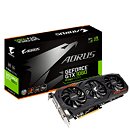- Joined
- Oct 9, 2007
- Messages
- 47,906 (7.37/day)
- Location
- Dublin, Ireland
| System Name | RBMK-1000 |
|---|---|
| Processor | AMD Ryzen 7 5700G |
| Motherboard | Gigabyte B550 AORUS Elite V2 |
| Cooling | DeepCool Gammax L240 V2 |
| Memory | 2x 16GB DDR4-3200 |
| Video Card(s) | Galax RTX 4070 Ti EX |
| Storage | Samsung 990 1TB |
| Display(s) | BenQ 1440p 60 Hz 27-inch |
| Case | Corsair Carbide 100R |
| Audio Device(s) | ASUS SupremeFX S1220A |
| Power Supply | Cooler Master MWE Gold 650W |
| Mouse | ASUS ROG Strix Impact |
| Keyboard | Gamdias Hermes E2 |
| Software | Windows 11 Pro |
In addition to a new pair of GeForce GTX 1080 graphics cards with faster 11 Gbps memory, GIGABYTE, through its Aorus brand, introduced a new custom-design GeForce GTX 1060 6 GB graphics card featuring faster 9 Gbps (GDDR5-effective) memory. The faster memory lends the GTX 1060 a memory bandwidth of 216 GB/s over its 192-bit wide interface.
The Aorus GTX 1060 6GB 9Gbps Edition (model: GV-N1060AORUS-6GD) features a premium-looking custom board design with a 2-slot thick triple-fan WindForce 3X cooling solution, mated to a custom-design PCB that draws power from a single 8-pin PCIe power connector; and a back-plate. The card comes with factory-overclocked speeds of 1607 MHz core, 1835 MHz GPU Boost, and 9.00 GHz (GDDR5-effective) memory, against reference speeds of 1506/1708/8008 MHz. The company didn't reveal pricing.




View at TechPowerUp Main Site
The Aorus GTX 1060 6GB 9Gbps Edition (model: GV-N1060AORUS-6GD) features a premium-looking custom board design with a 2-slot thick triple-fan WindForce 3X cooling solution, mated to a custom-design PCB that draws power from a single 8-pin PCIe power connector; and a back-plate. The card comes with factory-overclocked speeds of 1607 MHz core, 1835 MHz GPU Boost, and 9.00 GHz (GDDR5-effective) memory, against reference speeds of 1506/1708/8008 MHz. The company didn't reveal pricing.




View at TechPowerUp Main Site

